33 Keys to Decoding the Korean Wave
#27 K-Adoptees Sparkle in Culture
*한류를 이해하는 33가지 코드 #27 입양한인 예술가들 <Korean version>
https://www.nyculturebeat.com/index.php?mid=Focus&document_srl=4087666

As of April 2021, Korea's gross domestic product (GDP) reached $1.8 trillion, ranking 10th in the world. In 2020, the nation's trade volume stood at $980 billion, securing the 7th spot globally. Beyond its economic strength, Korea has emerged as a global cultural powerhouse. In the 21st century, the dynamic force of the Korean Wave—encompassing K-pop, K-cinema, K-drama, K-food, K-beauty, K-golf, K-book, and more—continues to transcend borders and captivate audiences worldwide.
However, it is important to remember Korea's past struggles with war and poverty. The Korean War of 1950 left approximately 7.2 million refugees, with around 450,000 soldiers and civilians losing their lives, and 60,000 children orphaned. The country, devastated by the war, saw many orphans adopted overseas, earning Korea the unfortunate title of the world's leading "orphan-exporting country." Since 1953, an estimated 200,000 Koreans have been adopted internationally, with three-quarters of them finding homes in the U.S.
Adopted Koreans grew up with new families in foreign lands, taking on new names and adapting to unfamiliar cultures. Many experienced identity struggles during adolescence, grappling with confusion, feelings of abandonment, and sorrow over their unknown biological roots. As adults, many have visited Korea in search of their origins and embraced their Korean heritage and talents, excelling in fields such as poetry, art, classical music, opera, ballet, film, comics, and cuisine—truly embodying the phrase “blood is thicker than water.”
Several prominent adoptees are shaping the global cultural landscape and contributing to the ongoing Korean Wave. Among them: opera singer Andrew Gangestad, who has performed on major international stages; ballerina Jennifer Whalen, who danced with American Ballet Theatre; Sara Sejin Chang (Sara van der Heide), whose work explores healing and decolonization through spiritual and historical narratives; filmmaker Deann Borshay Liem, who has chronicled adoption in powerful documentaries; and chef Danny Bowien, known for his bold Chinese flavors in the culinary scenes of San Francisco and New York City.
Although not an adoptee himself, violist Richard Yongjae O’Neill—whose mother was adopted from Korea—has brought Korean identity to the forefront of classical music through his performances and cultural ambassadorship. During my time as a reporter for The Korea Daily New York and a writer for NYCultureBeat.com, I had the privilege of meeting or interviewing these talented individuals—except for O’Neill.
# Bass Andrew Gangestad (Jeong Woo-geun)
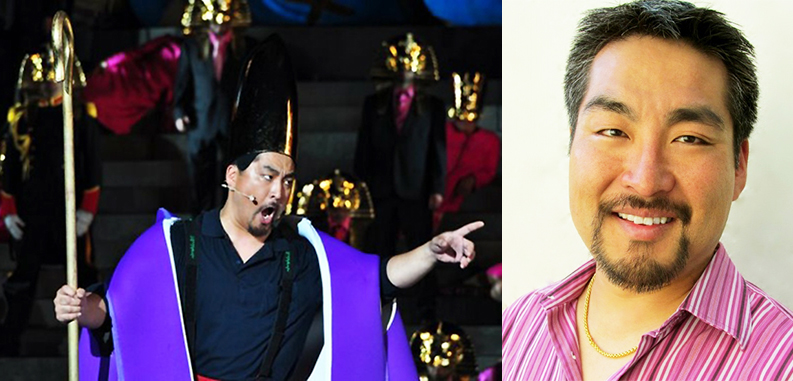
Bass Andrew Gangestad in "Aida" from the Bregenz Festival 2009 in Bregenz, Austria.
“Chillingly effective Ramfis,” “the evening’s best all-around performance,” “honeyed resonance, as the Count, all but stole the show,” “notes with rich, unfettered sound,” “marvelous voice, full and vibrant but capable of movement,” “unusually distinctive, majestic-voiced Timur,” “his luxurious, grandiose voice bursting with emotion,” “a glorious bass voice,” “a bass voice of great power and beauty”—these are just some of the glowing accolades bestowed upon bass Andrew Gangestad by critics. He has performed on the stages of prestigious institutions, including the Metropolitan Opera, New York City Opera, Minnesota Opera, Connecticut Opera, Kentucky Opera, Cincinnati Opera, Michigan Opera, Spoleto Festival, Welsh National Opera, and the Bregenz Festival in Austria.
Born Jeong Woo-geun in 1975, Andrew spent the early years of his life at Hope Orphanage in Cheongwon, North Chungcheong Province, South Korea. At the age of two, he was adopted by Sandy and Eugene Gangestad, a Minnesota couple who owned a lumber company. Initially rejected for adoption due to a tuberculosis diagnosis, Andrew’s adoptive parents funded his treatment, enabling a full recovery within a year. He moved to Two Harbors, Minnesota, where he grew up with his four sisters under his new name, Andrew Gangestad.
Gifted with a powerful voice, Andrew sang in his school choir and showcased his talent in musicals. Though he initially planned to study law at Minnesota State University (Duluth), a chance meeting with an exceptional vocal professor inspired him to pursue vocal music. After graduating, he reached the finals of the Metropolitan Opera National Council Audition in 2000 and won the prestigious Fritz & Lavinia Jensen Foundation Vocal Competition in 2005.
Andrew made his Metropolitan Opera debut in 1999 as Lodovico in Verdi’s Otello and subsequently performed in numerous operas, including Lulu, Don Carlo, Turandot, La Bohème, Don Giovanni, The Marriage of Figaro, The Barber of Seville, and Macbeth, excelling in both tragic and comedic roles.
In 2007, more than three decades after his adoption, Andrew returned to Korea for the first time. Carrying a black-and-white photograph from his time at the orphanage, he sought to reconnect with his roots. During his visit, he performed opera arias for the children at Hope Orphanage and sang Korean pieces such as Bimok (Tree of Sorrow) and Boat Song at the U.S. Embassy in Seoul. The trip was both a personal journey to rediscover his heritage and a professional milestone, as he performed alongside soprano Hei-kyung Hong in the Met Opera’s La Bohème in the Park series during the same year.
Now residing in Kansas City, Missouri, Andrew Gangestad continues to make significant contributions to the world of opera. Renowned for his commanding stage presence and extraordinary bass voice, he remains a distinguished figure in the operatic community.
http://andrewgangestad.com
#Ballet Dancer Jennifer Whalen (Nam Ji-yeon)
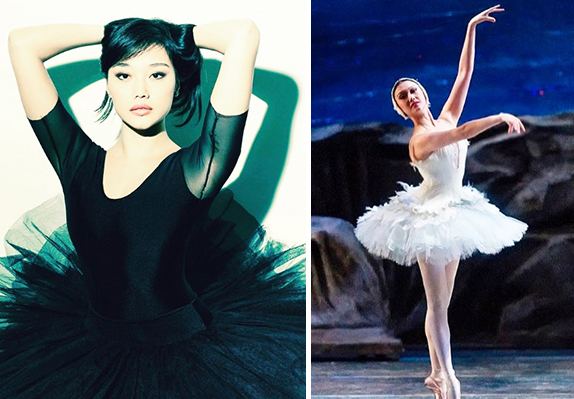
Jennifer Whalen in ABT's "Swan Lake"
Korean dancers continue to shine on the international ballet stage, particularly at the prestigious American Ballet Theatre (ABT), which performs regularly at the Metropolitan Opera House in Lincoln Center. In 2012, Hee Seo became the first Asian principal dancer at ABT, and in 2020, Joo Won Ahn was promoted to principal dancer. Among ABT’s 16 principal dancers, two are Korean. Additionally, Kimin Kim, the first Asian principal dancer at the Russian Mariinsky Ballet, has appeared as a guest artist at ABT. Notably, Hee Seo and Kimin Kim made history in 2015 as the first Asian male and female leads to perform together in ABT’s La Bayadère, portraying Nikiya and Solor.
Before Hee Seo’s rise in 2005, Jennifer Whalen (Korean name Nam Ji-yeon), a Korean adoptee, danced in ABT’s Corps de Ballet. Born in Seoul in 1985, Nam Ji-yeon was adopted at three months old by Barbara and Jeffrey Whalen, an American couple from Ventura, California. Jennifer’s passion for ballet ignited at the age of seven after watching a performance. She went on to train at the San Francisco Ballet, the Kirov Academy, and the Royal Ballet School in London.
Among her accolades are a gold medal at the Youth America Grand Prix and first place at the LA Performing Arts Spotlight. In 2002, at just 17 years old, Jennifer joined ABT as an apprentice and became a member of the Corps de Ballet the following year. During a 2008 interview with me for The Korea Daily, she fondly recalled how she began enjoying more Korean food, such as dolsot bibimbap, ribs, and kimchi, after Hee Seo joined the company.
In 2008, following a performance of Don Quixote during ABT’s tour in Korea, Jennifer began searching for her biological mother. Armed with adoption papers from the Eastern Social Welfare Society, listing her adoption number and basic birth details, she embarked on an emotional quest. Unfortunately, she was unable to locate her mother at that time. Four years later, during another ABT tour in Korea, Jennifer was finally reunited with her birth mother after 26 years.
As reported by The New York Daily News, the reunion was bittersweet. Jennifer expressed frustration at not being able to speak directly with her mother but was deeply curious about how much they resembled one another. Mother and daughter compared their heights, hand sizes, and foot sizes, discovering many similarities, including scoliosis—a spinal curvature that had been a challenge for Jennifer as a ballerina. Her mother expressed profound regret for giving her up but immense joy in seeing how Jennifer had grown into a beautiful and accomplished dancer.
Jennifer Whalen retired from ABT in 2017 after a 15-year career with the company. She now dedicates her time to teaching ballet, passing on her expertise and passion to the next generation of dancers at the Greenwich Ballet Academy in Connecticut and Broadway Dance Theater in New York City.
# Violist Richard Yongjae O'Neill

Richard Yongjae O'Neill and Ensemble
In 2021, violist Richard Yongjae O’Neill achieved a landmark accomplishment at the 63rd Grammy Awards, winning Best Classical Instrumental Solo for his album Theofanidis: Concerto for Viola and Chamber Orchestra. After previous nominations in 2006 and 2010, he triumphed on his third attempt. He is the first violist from Juilliard to receive an Artist Diploma, only the third violist to join the prestigious Chamber Music Society of Lincoln Center, and the youngest faculty member at UCLA’s School of Music.
Born in Sequim, Washington, in 1978, Richard was deeply influenced by his mother, Colin O'Neill (Korean name Lee Bok-soon), a Korean War orphan adopted by an American family in 1957. She had suffered permanent brain damage due to early malnutrition. Her hardships shaped Richard’s strong connection to his Korean heritage and the complexities of identity. Raised primarily by his white grandparents, Perry and Mildred O'Neill, he faced bullying for his Asian appearance and for having a mother with a disability while growing up in a majority-white town.
Initially trained on the violin, Richard transitioned to the viola at age fifteen. Drawn to its warm, melancholic timbre, he found the instrument to resonate deeply with him—emotionally and artistically. In a 2007 interview with Hankyoreh 21, he described the viola’s tone as “a woman’s low voice... like a mother’s warm voice.” The instrument became a vessel for expressing complex feelings of identity, memory, and belonging. He pursued music at the University of Southern California and later earned a full scholarship to Juilliard. His Korean name, Yongjae—meaning “brave talent”—was given by Juilliard professor Hyo Kang, solidifying his link to his heritage.
Richard’s career flourished as he performed with renowned orchestras such as the London Philharmonic, Los Angeles Philharmonic, Seoul Philharmonic, and Moscow Chamber Orchestra. In 2004, his story gained national attention in Korea through a KBS documentary series, Human Theater, which followed his emotional search for his mother’s Korean family. The documentary struck a chord with viewers and made him a household name. Two years later, in 2006, he received Lincoln Center’s Avery Fisher Career Grant, a prestigious honor that further elevated his status as a world-class musician.
In 2007, Richard founded the chamber ensemble DITTO to introduce chamber music to younger audiences in Korea. Featuring a rotating cast of talented Korean musicians, the group toured for twelve years across Korea, Japan, and China. DITTO became a phenomenon, often likened to a classical “idol group” for its ability to attract young, enthusiastic fans—bridging the gap between traditional chamber music and modern cultural trends.
Richard’s presence extended far beyond the concert hall. He served as a brand ambassador for the Korean Red Cross, the UN World Day of Peace, and the Special Olympics Committee of Korea. He also appeared in popular Korean programs such as the MBC drama Beethoven Virus and the variety show The Knee-Drop Guru, and authored several books including Richard Yongjae O’Neill’s Empathy, DITTO, and Me and Your Beethoven.
Throughout his career, Richard embraced his dual identity. In Korea, he found solace walking the stone paths of Deoksugung Palace and savoring traditional dishes like bulgogi and japchae, reconnecting with his roots. In 2019, he concluded his work with DITTO and returned to the United States, where he joined the acclaimed Takács Quartet.
Now performing with the ensemble, Richard Yongjae O’Neill continues to inspire as one of the most prominent violists of his generation—blending his Korean heritage with a dynamic global career.
# Artist Sara van der Heide (Chang Sejin)
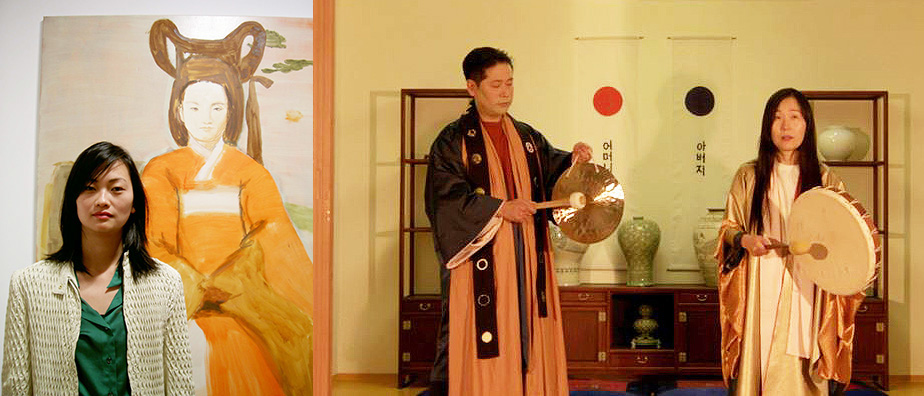
사라 반 더 하이데, 2007 Photo: Sukie Park/ Sara Sejin Chang, “Four Months, Four Million Light Years,” 2020. Photo: Silke Briel
When I interviewed her for The Korea Daily around 2007, she was known as Sara van der Heide and was an artist-in-residence in New York. At that time, she focused on painting, but today she is known as Sara Sejin Chang and is dedicated to performance and film work. Once private about her adoption experiences, Sara is now a vocal critic of the adoption industry and colonial history.
Born in Busan in 1977, Chang Sejin was adopted by a family in the Netherlands, a country renowned for its artists such as Vermeer, Rembrandt, and Van Gogh. The Netherlands also shares a historical link with Korea through Hendrick Hamel, whose Hamel’s Journal details his 13-year stay in Joseon following a shipwreck in 1653.
Sara studied as an exchange student at the State University of New York (SUNY, Purchase) in 1997 and later majored in Art and Drawing History Education at the Amsterdam Academy of Fine Arts. She continued her studies in painting at the Academy of Fine Art & Design (AKI) in the Netherlands. From 2006 to 2017, she was an artist-in-residence at the International Studio & Curatorial Program (ISCP) in New York and taught at various art schools in Utrecht, Amsterdam, and Groningen.
Her work has been featured in numerous prestigious exhibitions, including the 2009 International Women Artists' Biennale in Incheon, the 2012 Stedelijk Museum Amsterdam, the 2020 Berlin Biennale for Contemporary Art, and the 2022 Busan Biennale. In 2023, she held solo exhibitions in Stockholm, Utrecht, and Amsterdam. Currently based in Berlin, Sara continues to explore themes of identity, adoption, and colonialism through her art.
At the 11th Berlin Biennale for Contemporary Art, Sara’s piece Four Months, Four Million Light Years (2020) reflected her personal journey and addressed international politics and colonial history. Through her story of being adopted from a Busan orphanage to the Netherlands, Sara illuminated critical issues such as the disappearance of adopted children, document falsification, and child trafficking during the 1970s—when international adoptions from Korea were at their peak. Her work also confronted the violent eradication of shamanistic culture by missionaries and highlighted the broader criminality of modern cross-border adoption.
Growing up as an adoptee of color in the Netherlands, Sara experienced firsthand the Eurocentric attitudes fostered by the Dutch “golden age,” which also marked a period of violence and colonization. These experiences of pain, loss, and trauma related to her identity as an adopted Korean, female artist, and Asian became central to her work. In her art, she transforms these experiences—much like a shaman performing a healing rite—offering not only personal catharsis but also a powerful critique of colonial history. Sara Sejin Chang dedicates her work to global adoptive families, using art as a medium for healing and understanding. https://www.sarasejinchang.com
# Filmmaker Deann Borshay Liem (Kang Ok-jin)
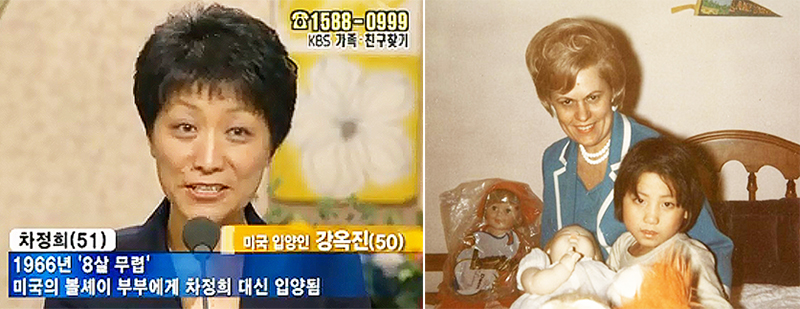
In The Matter of Cha Jung Hee, 2010/ Deann Borshay Liem with her adoptive mother
Director, producer, and writer Deann Borshay Liem made her filmmaking debut with First Person Plural (2000), a feature-length documentary that explores the complexities of her own adoption. Adopted by a family in San Francisco in 1966, Deann traveled on the passport of another girl, Cha Jung Hee, when she was 8 years old. As an adult, while investigating her adoption records, she discovered her real name was Kang Ok-jin. Her adoption papers had been falsified by the orphanage, adding to the layers of identity confusion as she grew up in the U.S. living under someone else’s name.
Her adoptive father documented Deann’s transformation into an "American girl" from the moment she arrived at the airport. After earning a degree in psychology from the University of California, Berkeley, Deann turned to filmmaking to tell her own story. Accompanied by her adoptive parents, she returned to Korea to unravel the mystery of her identity, eventually reuniting with her biological family in Gunsan, North Jeolla Province.
The documentary poignantly captures this emotional journey, filled with unspoken grief and tears of reconciliation. First Person Plural was invited to the Sundance Film Festival, won the Grand Jury Prize at the San Francisco International Film Festival in the documentary category, and was nominated for an Emmy Award for Best Director.
Ten years later, Deann embarked on her second film, returning to Korea to search for the real Cha Jeong-hee, whose name had been assigned to her on her adoption papers, legal documents, and even her driver's license. In In the Matter of Cha Jung Hee (2010), Deann delves deeper into the secrets and lies that shaped her identity, while addressing the broader social issues of international adoption. Probably, the process of making the film became a form of therapy and healing as she sought to reconcile her past. The film earned the Special Jury Award, Best Director, and Best Editing at the LA Asian Pacific Film Festival.
In 2013, Deann co-directed Memory of Forgotten War with Boston University psychology professor Ramsay Liem, a documentary about the division of Korea and the separation of families. A Sundance Institute Fellow and recipient of the Rockefeller Film/Video Fellowship, Deann continues to tell impactful stories of identity, family, and history. She is married to Paul Liem, Chairman of the Korea Policy Institute.
https://www.mufilms.org
# Chef Danny Bowien (Choi Won-sung)
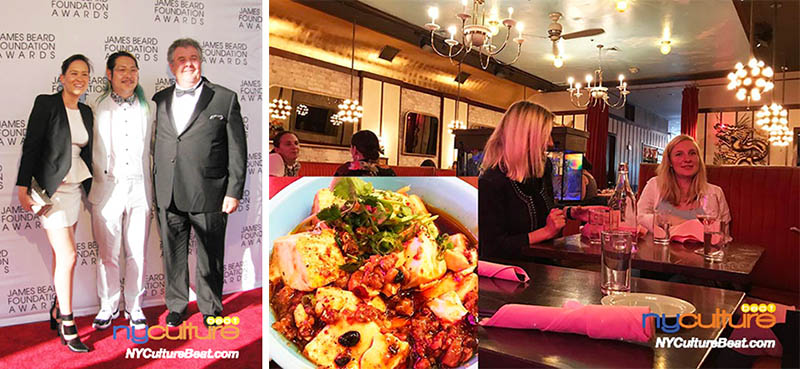
Danny Bowien with his wife and father at the James Beard Foundation Awards in 2013/ Mission Chinese Food in East Broadway and Mapotofu Photo: Sukie Park/NYCultureBeat
Alongside culinary innovators like David Chang of Momofuku in New York, Roy Choi of Kogi in Los Angeles, Edward Lee of 610 Magnolia in Louisville, and Corey Lee of Benu in San Francisco, Danny Bowien is a Korean American chef who helped ignite the Korean chef craze in the United States.
Born Choi Won-sung in Korea in 1982, Danny was adopted by the Bowien family in Oklahoma City at three months old. Growing up, he developed a passion for cooking by watching TV cooking shows with his adoptive mother. By the age of 13, he had his first restaurant job washing dishes at a Vietnamese restaurant. Outside of the kitchen, Danny played drums in a rock band during high school. It wasn’t until he was 19, after moving to San Francisco, that he tasted Korean food for the first time.
Danny trained at a culinary school in San Francisco before moving to New York, where he worked in several restaurant kitchens. Later, he returned to San Francisco and gained recognition by winning a pesto competition in Genoa, Italy, in 2008 while working in an Italian restaurant.
In 2010, Danny co-founded the pop-up Mission Chinese Food in San Francisco’s Chinatown with Anthony Myint, becoming known for his innovative take on Sichuan cuisine. An adopted Korean chef winning a pesto competition in Italy and then opening a Chinese restaurant might seem unconventional, but it mirrors the journey of David, who rose to fame not with Korean cuisine but with Japanese ramen and Chinese-inspired dishes. What unites chefs like Danny and David is their focus on "delicious food" and "Americanized Asian food," transcending the boundaries of traditional national cuisine.
In 2013, Danny opened a New York outpost of Mission Chinese Food on Manhattan’s Lower East Side. His inventive dishes, such as Kungpao corned beef, Chongqing chicken wings, and bacon-and-rice cake combinations, won over New York Times critic Pete Wells, earning the restaurant two stars.
That same year, Danny received the James Beard Foundation Award for Rising Star Chef, while David won the Outstanding Chef award. Both chefs were recognized not only for showcasing Korean talent but also for popularizing diverse Asian cuisines, including Japanese ramen and Chinese Sichuan dishes. Their success reflects the spirit of bibimbap—embracing creativity and flexibility rather than strict adherence to tradition.
Though the New York branches of Mission Chinese Food closed during the COVID-19 pandemic—first the Lower East Side location in 2020, followed by the Bushwick branch in 2022—the original San Francisco location remains open. Danny shares a son with Korean American comedian Youngmi Mayer.
*Beyond BBQ and Kimchi: Five Korean-American Star Chefs at Inside Korea’s Table
Kristen Kish, from Chef to TV Show Host

Adopted Korean chef Kristen Kish was selected as the host for the 21st season of cable TV Bravo channel’s cooking competition program “Top Chef” in July 2023.
Kristen Kish’s birth name, born in Seoul in 1983, is Kwon Young-ran. She grew up in an orphanage from the time she was a newborn, and when she was four months old, she was adopted by an American family and raised in Kentwood, Michigan.
Kish worked as a model in high school, and she studied at the culinary school Le Cordon Bleu in Chicago. Since 2012, she has been an instructor at celebrity chef Barbara Lynch’s cooking demonstration kitchen “Stir” in Boston, where she moved on to become Chef de Cuisine, and she also served as Chef de Cuisine at Lynch’s “Menton.” In 2018, she became the chef/owner of “Arlo Grey” in Austin, Texas.
Kristen Kish, who became known by appearing on “Top Chef” in 2012, co-hosted with Kyle Martino on the Travel Channel’s “36 Hours,” an adaptation of the New York Times series in 2015, and will be hosting Netflix’s “36 Hours” in 2022. She appeared in the “Iron Chef” series “Quest for an Iron Legend,” and went on to host the National Geographic series “Restaurants at the End of the World.”
NYT: "Adopted Chefs, Korean Cuisine, and Identity"
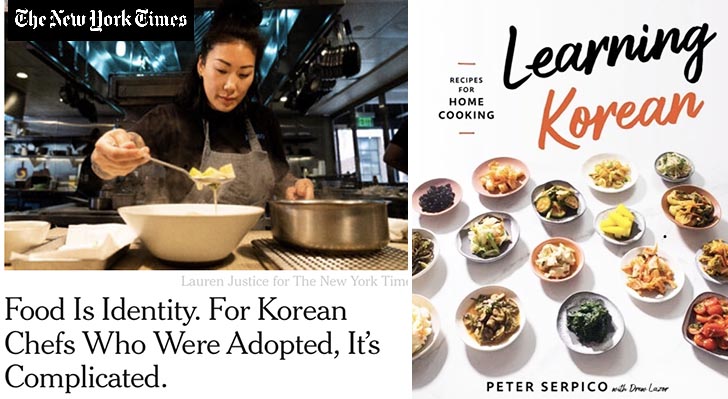
NYT, Adopted Chefs, Korean Cuisine, and Identity, July 31, 2022/ Peter Serpico's cookbook 'Learning Korean' (2022)
Korean American chefs like Danny Bowien, David Chang, Corey Lee, Edward Lee, and Roy Choi may have paved the way for adopted Korean chefs in the U.S. In a July 31, 2022, article titled "Food Is Identity. For Korean Chefs Who Were Adopted, It’s Complicated," The New York Times explored the complex relationship between adoption, identity, and food for these chefs.
The article featured several adoptee chefs, including Katianna Hong, owner of Yangban Society in Los Angeles; Melanie Hye Jin Meyer, operator of Tiny Chef - Korean Inspired Street Food in St. Louis; Tony Miller, chef of Graze in Madison, Wisconsin; Kate Telfeyan of Porcelain in Queens, New York; Peter Serpico, chef of a pop-up restaurant Actually Good in Philadelphia; Matt Blesse, a chef who moved to Korea; and Alyse Whitney, who runs the online recipe exchange site Adoptee Potluck Club. They shared their experiences of navigating their identities through cooking.
The Times noted, “For a Korean adoptee, eating Korean food can serve as a reminder of the loss, grief, and disconnection they’ve experienced. Cooking may intensify those feelings.” For many adoptee chefs, however, cooking Korean food is “the ultimate reclamation of their Korean-ness—and an act that propels the cuisine to exciting places.” The article also highlighted that since 1953, about 200,000 Koreans have been adopted worldwide, with three-quarters of them adopted by American families.
Sukie Park
A native Korean, Sukie Park studied journalism and film & theater in Seoul. She worked as a reporter with several Korean pop, cinema, photography and video magazines, as a writer at Korean radio (KBS-2FM 영화음악실) and television (MBC-TV 출발 비디오 여행) stations, and as a copywriter at a video company(대우 비디오). Since she moved to New York City, Sukie covered culture and travel for The Korea Daily of New York(뉴욕중앙일보) as a journalist. In 2012 she founded www.NYCultureBeat.com, a Korean language website about cultural events, food, wine, shopping, sightseeing, travel and people. She is also the author of the book recently-published in Korea, "한류를 이해하는 33가지 코드: 방탄소년단(BTS), '기생충' 그리고 '오징어 게임'을 넘어서 (33 Keys to Decoding the Korean Wave: Beyond BTS, Parasite, and Squid Game)."
한류를 이해하는 33가지 코드
*Buy Here <US>
-KBOOKSTORE US $48.60
https://kbookstore.com/catalog/product/view/_ignore_category/1/id/694563/s/33-9788978895323
-반디북스 Bandi Books US $51.30
https://www.bandibookus.com/front/product/detailProduct.do?prodId=4461303
888-880-8622(Toll Free)
-고려서적 Koryo Books $90-$100
맨해튼 212-564-1844/ 뉴저지 201-461-0008
*Buy Here <Korea>
-알라딘 Aladin ₩40,500
https://www.aladin.co.kr/shop/wproduct.aspx?ItemId=318150433
[신간 안내] 한류를 이해하는 33가지 코드: 방탄소년단(BTS), 기생충과 오징어 게임을 넘어서
https://www.nyculturebeat.com/index.php?mid=Lounge2&document_srl=4097797
[NEW Book] '33Keys to Decoding the Korean Wave: Beyond BTS, Parasite and Squid Game'
https://www.nyculturebeat.com/index.php?mid=Zoom&document_srl=4097451
[언론 보도] 한류를 이해하는 33가지 코드
한국 중앙일보(중앙Sunday), 뉴욕 중앙일보, LA 중앙일보, 밴쿠버 중앙일보, 뉴욕일보, LA한국일보, 라디오 코리아...
https://www.nyculturebeat.com/index.php?mid=CulBooks&document_srl=4097741
[Media Coverage] '33Keys to Decoding the Korean Wave: Beyond BTS, Parasite and Squid Game'
https://www.nyculturebeat.com/index.php?document_srl=4097755&mid=Lounge2
[서점 통신] 한류를 이해하는 33가지 코드: 출간 이후
교보문고(반포 지점) 비치/ 알라딘 주간 베스트 인문-문화이론 부문 40위(6/13)/ 알라딘 첫 리뷰
https://www.nyculturebeat.com/index.php?mid=Lounge2&document_srl=4098111
*[들어가는 글] 뉴욕에서 한류를 목격하며...
https://www.nyculturebeat.com/index.php?mid=Focus&document_srl=4099765
*'한류를 이해하는 33가지 코드: BTS, 기생충, 그리고 오징어 게임을 넘어서'에 무엇이?
https://youtu.be/29auuZ2a_Ig






이들을(비올리스트 오닐을 빼고)인터뷰하고 기사를 쓴 컬빗에 감사를 드립니다.
-Elaine-